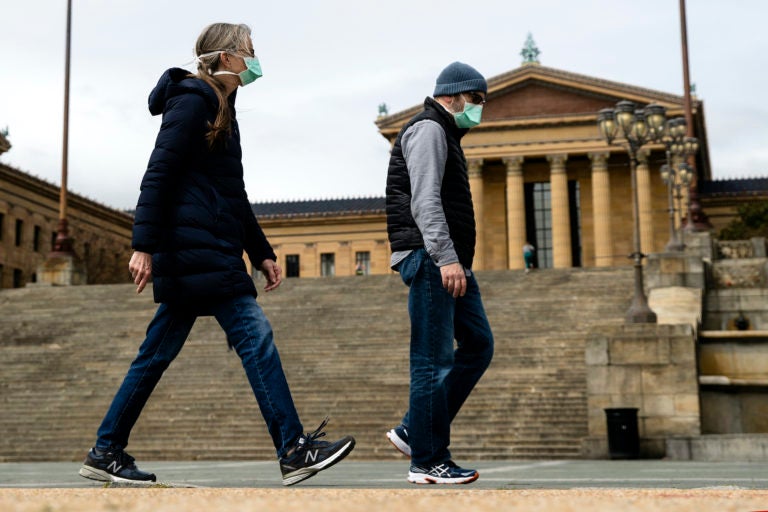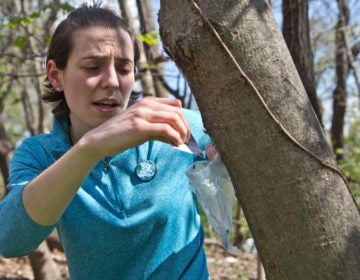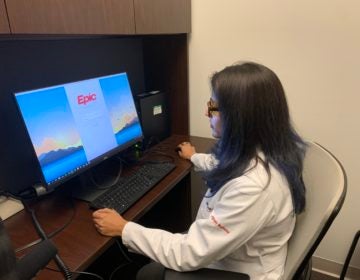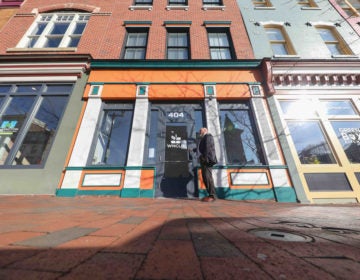Coronavirus update: NJ Transit to cut train, bus capacity; former Ukrainian Catholic leader dies of COVID-19
Gov. Phil Murphy’s executive order also requires NJ Transit and private carriers to supply their workers with gloves and face coverings.

A couple in protective masks walk past the Philadelphia Museum of Art in Philadelphia, Friday, April 3, 2020. (Matt Rourke/AP Photo)
Updated 7:25 p.m.
Are you on the front lines of the coronavirus? Help us report on the pandemic.
As of Saturday, there are 21,785 confirmed COVID-19 cases in Pennsylvania, 58,151 in New Jersey, and 1,479 cases in Delaware. Philadelphia has 6,152 cases.
Pennsylvania’s death toll stands at 494, New Jersey’s at 2,183, and Delaware’s at 33. Philadelphia’s death toll is 160.
Murphy signs executive order cutting NJ Transit capacity
New Jersey has reported 3,599 new COVID-19 cases. As of 10 p.m. Friday, 7,618 people in the state were hospitalized; 1,746 were in intensive care, with 1,650 ventilators in use.
Gov. Phil Murphy announced Saturday that he is signing an executive order directing NJ Transit and all private transportation carriers to cut capacity on all trains, buses, light rail vehicles, and paratransit vehicles to 50% of their maximum.
The order also requires NJ Transit and private carriers to supply their workers with gloves and face coverings, and states that riders must wear face coverings while traveling unless they cannot for medical reasons.
“For many of our essential workers, public transit is how they get to work, and we need to protect them during that trip,” Murphy said.
Some discretion on this order will be left up to drivers on NJ Transit and the private carriers, Murphy said.
Part of the order includes expanding face-covering requirements to all customers heading into restaurants and bars that remain in operation for takeout orders. If a customer is getting curbside pick-up and not walking into a business, a face covering is not required.
Restaurants will also be required to give face coverings and gloves to their food service workers.
The executive order goes into effect at 8 p.m. Monday.
Former Ukrainian Catholic Archbishop Stephen Sulyk dies from COVID-19 at 95
The Archeparchy of Philadelphia announced Saturday the death of the former leader of the region’s Ukrainian Catholic Church, Metropolitan-Archbishop Emeritus Stephen Sulyk. He died at age 95 on April 6 from complications related to the coronavirus while a patient at Virtua Voorhees Hospital in South Jersey.
Sulyk was appointed metropolitan-archbishop of Philadelphia by St. John Paul II in 1980, becoming spiritual leader of Ukrainian Catholics in five states and the District of Columbia. The pope accepted his resignation in 2000, when Sulyk reached the canonical retirement age.
He was born in western Ukraine in 1924, and after World War II forced him to leave the country, he entered Ukrainian Catholic Seminary in Germany. After immigrating to the United States, he earned his seminary degree from the Catholic University of America in 1952 and was ordained into the priesthood that same year at the Ukrainian Catholic Cathedral of the Immaculate Conception at Eighth and Franklin streets.
Sulyk’s first pastoral assignment was in 1955 in Phoenixville. He held posts as pastor at several churches in Pennsylvania and New Jersey prior to becoming archbishop.
He supervised renovation of the sanctuary of Philadelphia’s Ukrainian Catholic Cathedral and construction of a new chancery center, bishop’s residence, and cathedral rectory. After his retirement, Sulyk lived in Cherry Hill.
“Bishops have written letters of condolences from many lands recounting beautiful moments shared with the Archbishop and listing various generous gestures made by him,” wrote Philadelphia Archbishop-Metropolitan Borys Gudziak on the archeparchy’s website. “I trust that these reminiscences will be published and will contribute to the lasting legacy of a man who overcame the challenges faced by a village boy whose youth was scarred by a devastating war. Not a stone is left standing in Metropolitan’s home village, today found in southwestern Poland. His beloved village is gone. But the legacy of its son will remain among us.”
Because of the pandemic, private funeral services will take place Monday, April 13, led by Metropolitan-Archbishop Borys Gudziak in the Ukrainian Catholic Cathedral.
The funeral will be shown on Facebook Live through the Archeparchy of Philadelphia Facebook page at 10 a.m. on Bright Monday, April 13.
No decision yet on N.J. school closure for remainder of the year
New York City Mayor Bill DeBlasio announced Saturday that public schools there will remain closed for the rest of the school year. But just a few hours later, New York Gov. Andrew Cuomo contradicted DeBlasio, saying no decision on the schools had been made.
That followed Thursday’s announcement that Pennsylvania schools will be closed for the rest of the school year.
On Saturday, New Jersey Gov. Murphy said he has not yet made a decision but that he hopes to have “some harmony in the region” with neighboring states.
“Today, I’ve been lobbied hard to reopen schools by parents, particularly those who are in sports, and I can understand their frustration, but we have to make our decisions based on data, and fact and science, and we will do that,” Murphy said.
The governor said he plans to have an update on school closure plans by next Friday, April 17.
Meanwhile, Murphy said the National Governors Association is asking the federal government for $500 billion in direct state aid that would help with individuals who are unemployed, small businesses, and caring for individuals in state health systems.
“We are desperately in need [of] direct cash federal assistance, directly to states,” Murphy said.
New Jersey is among the states that would be most dependent on federal aid to keep itself running if the coronavirus pandemic devastates state revenues across the country, as is expected.
More Philly cases inside correctional facilities; meal distribution schedule change
Philadelphia officials confirmed that as of Saturday five additional individuals incarcerated have tested positive for COVID-19, bringing the total to 63 inside the city’s correctional facilities.
A new program in Pennsylvania, announced Friday, will temporarily release 1,800 non-violent people from state prisons to slow the spread of coronavirus.
The School District of Philadelphia’s 49 meal distribution sites will be closed on Monday, April 13, because of the impact the observance of Good Friday had on the meal packing schedule.
The Monday and Thursday school distribution schedule will resume as normal on Thursday, April 16.
The 40 city-supported food sites were not affected by Good Friday and will be open on Monday.
Latest Pa. numbers show 10% of total case count hospitalized
During a Saturday press briefing, state Health Secretary Rachel Levine shared the latest available numbers for COVID-19 cases in Pennsylvania, showing that more than 2,000 people are hospitalized due to the virus across the state. Of those hospitalized, 617 currently require the use of a ventilator or breathing machine, she said.
As of now, Levine said, the state’s health system has not yet reached capacity, with 46% of hospital beds, 38% of ICU beds, and roughly 70% of its ventilators still available.
Hazleton meat-packing plant outbreak: Levine says grocery store products are safe
Cargill Meat Solutions — a meat-packing plant in Hazleton, Luzerne County, that supplies products to Pennsylvania grocery stores — closed earlier this week after at least 130 workers tested positive for COVID-19.
Pennsylvania Health Secretary Rachel Levine said there is no evidence that coronavirus could survive the freezing process that occurs at the plant. She said that she’s in constant conversation with state Agriculture Secretary Russell Redding, and that there is “confidence” in our food supply.
She added that the Wolf administration will be releasing guidance by Monday for individuals in food processing plants and grocery stores.
As members of the state House work on a bill that would allow some businesses to reopen, Levine emphasized that from a public health perspective, the commonwealth is not ready yet.
“I understand the legislature’s concern about the economy and the desire to stimulate the economy, but now is not the time,” Levine said. “Now is the time for people to stay home and for those non-life-sustaining businesses to be closed.”
Montco readies hospital surge unit, as community test site moves
A 40-bed unit within Suburban Community Hospital in East Norriton is being set up to take both COVID-19 and non-COVID-19 patients, should the local health system reach surge capacity.
The unit is being constructed by and will be staffed with volunteer physicians, nurses and other health care professionals from the Southeastern Pennsylvania Surge Medical Assistance Response Team.
“We are hopeful that we will not need this surge hospital capacity, but it is very reassuring that these beds are there should we need them, and this will be a tremendous asset for our entire region,” Montgomery County Commissioners Chair Val Arkoosh said Friday.
Montgomery County reported 120 new cases on Saturday, bringing the county total to 1,815, the second-highest in the state after Philadelphia.
Arkoosh also said the Federal Emergency Management Agency-funded community drive-through testing site at Temple University Ambler that closed earlier this week will reopen next week at Montgomery County Community College in Whitpain Township. She said she hopes it will be up and running by April 15 through the same by-appointment process used at the Ambler campus site.
Nearly 5,000 people were tested at the Ambler site.
Del. governor calls for community help with health care, child care
Gov. John Carney expanded his “community call-to-action,” first issued April 2, urging Delawareans with child care and health care experience to assist in the state’s efforts to curb the spread of coronavirus.
The state has launched an online application portal to fill critical positions in the child and health care workforces.
For positions in the medical, public health, and behavioral health sectors, applications will be reviewed by the Delaware Division of Public Health and shared with institutions in need of help across the state.
Those who are licensed or certified to work in child care or education can apply for potential temporary employment through the state’s emergency child care sites. Applications for those jobs will be reviewed by Delaware’s Office of Early Learning.
Last week, Carney asked for assistance from businesses and nonprofits with access to emergency materials and supplies. Those items include hand sanitizer, sanitizing wipes, nitrile gloves, Tyvek suits, N95 masks, face shields and eye protection, and impermeable gowns.
Pa. rolls out new federal unemployment benefits
Gov. Tom Wolf says the state Department of Labor and Industry is implementing the new unemployment benefits made possible by the federal CARES Act. The stimulus relief package will provide an additional $600 per week to those eligible, and makes self-employed individuals, independent contractors, and gig workers eligible for unemployment compensation.
The CARES Act also extends available benefits for an additional 13 weeks. The federal benefits are in tandem with the commonwealth’s own unemployment compensation, which is half of an eligible person’s full-time weekly income (up to $572) for 26 weeks.
The Labor and Industry Department sent out the first $600 payments to eligible Pennsylvanians on Friday. Eligible applicants who filed biweekly claims for the week ending April 4 and who have already received their regular unemployment benefits should see the federal benefit by early next week.
Those who haven’t received their regular unemployment benefits yet will get their first $600 checks one week after getting their first unemployment claim payments.
Self-employed people, independent contractors, and gig workers will receive benefits through the federal Pandemic Unemployment Assistance program. However, these workers cannot apply for assistance through the state’s unemployment claim system, and the U.S. Department of Labor is requiring that the Pandemic Unemployment Assistance program be tracked separately from regular unemployment claims. Pennsylvania plans to build an online platform specifically to process PUA claims. The state hopes to have that platform up and running for eligible individuals to start applying for those benefits within the next two weeks.
The state confirmed Friday that nearly 200,000 unemployment claims were filed in the five-county Philadelphia region between March 22 and April 4.
Delaware County starts food donation campaign for health care workers
Drexelbrook, a catering company and events space in Drexel Hill, and Visit Delco have teamed up to donate ready-to-eat meals to health care workers in Delaware County.
Through Drexelbrook’s website, you can donate a recommended $9.50 for “Food for the Frontline Power Meals” that will then be sent to local health professionals. The meals will be donated and sent to hospitals in the county after every 25 orders donated. A single purchase of 25 meals will guarantee a 24-hour delivery and a customizable message on your behalf.
Local members of Congress want support for safety-net hospitals
Democratic U.S. Reps. Dwight Evans, Brendan Boyle, and Madeleine Dean and Republican Rep. Brian Fitzpatrick sent a request Friday to the U.S. Department of Health and Human Services and the Centers for Medicare and Medicaid Services asking for support for safety-net hospitals — including those in the Philadelphia region — that are at risk of experiencing patient surges.
Their letter calls on the heads of the two federal agencies to ensure that such hospitals get CARES Act priority funding.
“We respectfully request that the method through which these funds are distributed prioritize hospitals with the greatest immediate need, including those operating in underserved communities,” the lawmakers said in the letter.
The letter points to Philadelphia as an area with already high levels of uncompensated care, and notes that White House coronavirus response coordinator Deborah Birx said earlier this week that Philadelphia may become a virus “hot spot.”
City health officials don’t think that’s as likely as the national officials make it sound. Friday morning at Temple University’s Liacouras Center, which has been prepared to serve as an overflow facility if Philly hospitals experience that surge, city Managing Director Brian Abernathy said that although the number of positive coronavirus cases in Philadelphia may be declining, the city is still a regional hub, meaning its health system could possibly receive patients from Delaware, northern Maryland and southern New Jersey.
Rep. Evans and Boyle serve on the House Ways and Means Committee, which oversees the national health care system.
WHYY is your source for fact-based, in-depth journalism and information. As a nonprofit organization, we rely on financial support from readers like you. Please give today.




![CoronavirusPandemic_1024x512[1]](https://whyy.org/wp-content/uploads/2020/03/CoronavirusPandemic_1024x5121-300x150.jpg)



